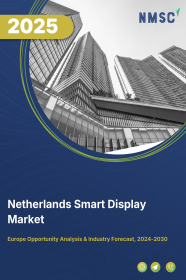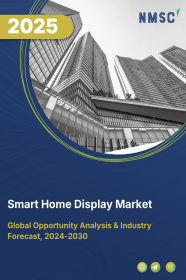
Netherlands Smart Display Market by Display Technology (LCD, LED, E-Paper Display, and Other Display Technologies), by Type (Standalone Smart Displays, Integrated Smart Displays, Interactive Touchscreen Displays, Transparent Smart Displays, and Other Display Types), by Display Size (Below 24 Inch, 24 Inch to 55 Inch, and Above 55 Inch), by Resolution (UHD, FHD, HD, and Others) and Others – Opportunity Analysis and Industry Forecast, 2023–2030
Industry: Semiconductor & Electronics | Publish Date: 15-Feb-2025 | No of Pages: 81 | No. of Tables: 63 | No. of Figures: 26 | Format: PDF | Report Code : SE1018
Market Definition
Netherlands Smart Display Market was valued at USD 269.78 million in 2022, and is predicted to reach USD 942.08 million by 2030, with a CAGR of 15.2% from 2023 to 2030. A smart display is a technologically advanced device equipped with a touchscreen or interactive visual interface, integrated with voice recognition and artificial intelligence capabilities.
These displays serve as information hubs that can perform a variety of functions, including displaying information, controlling smart home devices. It provides visual responses to voice commands, enabling video calls, and serving as interactive tools for tasks such as scheduling, weather updates, and entertainment.
Smart displays are designed to enhance convenience, accessibility, and user interactivity in various contexts, such as homes, offices, and public spaces. These displays are utilized in various settings, including residential homes, offices, healthcare facilities, retail, education, and more.
Revolutionizing Homes: The Driving Force of Smart Home Integration on Netherlands' Smart Display Market
The surging trend of home automation and widespread integration of smart home appliances in the Netherlands are pivotal factors propelling the smart display market in the country. Notably, the Netherlands has positioned itself as a frontrunner in Europe for the use of smart home devices, according to Statistics Netherlands (CBS).
The increasing adoption of smart devices corresponds to a growing demand for smart home solutions in the Netherlands, driven by the convenience and time-saving advantages they offer for seamlessly managing automated households. This rising adoption of smart home technology positions the Netherlands as an exceptionally promising market, showcasing the nation's leadership in embracing cutting-edge domestic technologies. This, in turn, directly influences the growth prospects of the smart display market.
Netherlands Unleashed: Smart Displays Revolutionizing Urban Landscapes in the Digital Era
In the dynamic landscape of the Netherlands, the fusion of rapid urbanization and a sweeping digital transformation is paving the way for a smart revolution. As cities evolve, businesses and urban infrastructure are seizing the opportunity to enhance communication and information dissemination through the integration of smart displays.
These interactive and cutting-edge technologies not only mirror the pulse of urban life but also play a pivotal role in shaping a connected and informed society. The Netherlands is embracing a future where smart displays stand as beacons of innovation, seamlessly woven into the fabric of urban living.
Security Vulnerabilities in Smart Home Displays Restrain Market Growth
Security vulnerabilities in smart display technology represent a significant restraining factor for the smart display market. The potential for security breaches in smart displays poses a substantial risk to users. Insufficient security measures, such as weak passwords and inadequate encryption, could lead to the exposure of sensitive data. Therefore, it is imperative for manufacturers to prioritize robust security features within smart displays, including strong authentication methods and prompt vulnerability patching through regular updates.
Introduction of Laser-Based Display Technology
Laser-based display technology is presenting substantial opportunities within the smart display market. Its exceptional brightness, color accuracy, long-lasting durability, and energy efficiency position it as a prime choice for diverse applications, spanning from home theaters to outdoor signage and augmented reality experiences. The extended lifespan and reliability of laser-based displays result in reduced maintenance costs and align with sustainability objectives.
As this technology becomes increasingly accessible and cost-effective, it is instigating innovation in the realm of smart displays, particularly in sectors where top-tier visual quality and energy conservation are paramount, thus broadening the market's potential for expansion.
Competitive Landscape
The Netherlands smart display industry includes several market players such as Samsung Electronics, Qisda Corporation (BenQ), LG Corporation, Sharp Corporation, Lenovo Group Limited, Alps Alpine Co., Ltd, Sony Corporation, Google, LLC., Leyard Optoelectronic Co., and Amazon.com, Inc.
Key Benefits
-
The Netherlands smart display market report provides a quantitative analysis of the current market and estimations through 2023-2030 that assists in identifying the prevailing market opportunities to capitalize on.
-
The study comprises a deep dive analysis of the market trend including the current and future trends for depicting the prevalent investment pockets in the market.
-
The information related to key drivers, restraints, and opportunities and their impact on the market is provided in the report.
-
The competitive analysis of the market players along with their market share in the Netherlands smart display market.
-
The SWOT analysis and Porter’s Five Forces model are elaborated in the study.
-
Value chain analysis in the market study provides a clear picture of the stakeholders’ roles.
Netherlands Smart Display Market Key Segments
By Display Technology
-
LCD
-
LED
-
E-Paper Displays
-
Other Display Technologies
By Type
-
Standalone Smart Displays
-
Integrated Smart Displays
-
Interactive Touchscreen Displays
-
Transparent Smart Displays
-
Other Display Types
By Display Size
-
Below 24 inch
-
24 inch to 55 inch
-
Above 55 inch
By Resolution
-
UHD
-
FHD
-
HD
-
Others
By Sales Channel
-
Direct Sales
-
Retailers and Distributors
-
E-Commerce Or Online Sales
By Application
-
Smart Home
-
Digital Signage
-
Automotive
-
Healthcare
-
Other Applications
REPORT SCOPE AND SEGMENTATION:
|
Parameters |
Details |
|
Market Size in 2022 |
USD 269.78 Million |
|
Revenue Forecast in 2030 |
USD 942.08 Million |
|
Growth Rate |
CAGR of 15.2% from 2023 to 2030 |
|
Analysis Period |
2022–2030 |
|
Base Year Considered |
2022 |
|
Forecast Period |
2023–2030 |
|
Market Size Estimation |
Million (USD) |
|
Growth Factors |
Surging trend of home automation The rapid urbanization and digital transformation. |
|
Companies Profiled |
10 |
|
Market Share |
Available for 10 companies |
|
Customization Scope |
Free customization (equivalent up to 80 working hours of analysts) after purchase. Addition or alteration to country, regional, and segment scope. |
|
Pricing and Purchase Options |
Avail customized purchase options to meet your exact research needs. |
KEY PLAYERS
-
Samsung Electronics
-
Qisda Corporation (BenQ)
-
LG Corporation
-
Sharp Corporation
-
Lenovo Group Limited
-
Alps Alpine Co., LTD
-
Sony Corporation
-
Google, LLC.
-
Leyard Optoelectronic Co
-
Amazon.com, Inc.

















 Speak to Our Analyst
Speak to Our Analyst



















